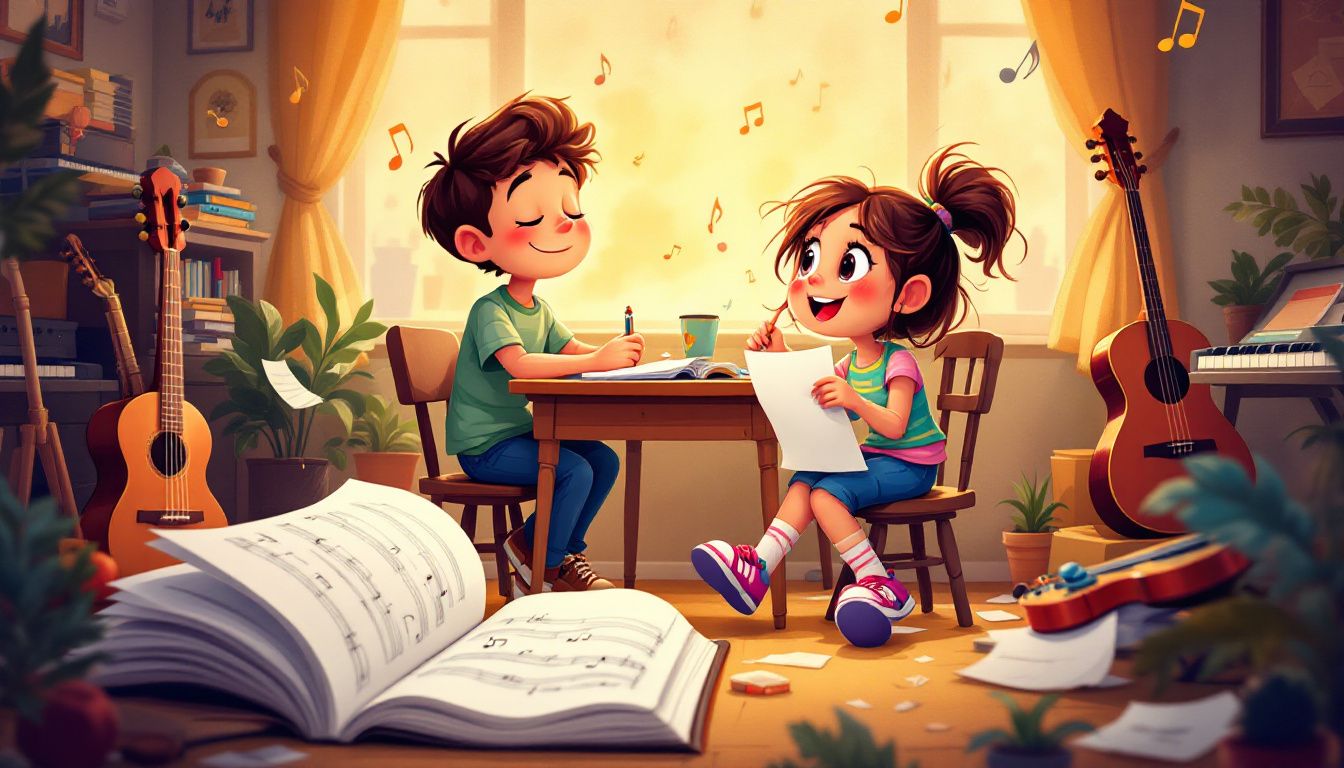
Creating vs. Copying: Why Original Music Matters for Kids
When you think about music lessons, what comes to mind? For many of us, it's the memory of practicing scales and reproducing classical pieces note by note. But what if there was a more engaging way for children to learn music – one that nurtures their creativity while building essential life skills?
Beyond Playing the Notes
Think about learning a language. While it's important to learn vocabulary and grammar, the real magic happens when children start creating their own sentences and expressing their unique thoughts. Music works the same way. When children only learn to play existing pieces, they're learning the "vocabulary" of music. But when they create their own songs, they're learning to express themselves in their own unique musical voice.
The Power of Original Creation
Creating original music does something remarkable for children:
- It develops problem-solving skills as they work out melodies and rhythms
- It builds confidence in their creative abilities
- It helps them understand music from the inside out
- It makes learning more personally meaningful
- It keeps them engaged and excited about music
Think of it this way: when your child draws a picture, you don't expect them to only copy famous artworks. You celebrate their unique creations, no matter how simple. The same should be true for music.
Why Traditional Methods Aren't Enough
Traditional music education often focuses on perfecting technique and reproducing existing pieces. While these skills are important, they're just one piece of the puzzle. Here's what children miss out on when they only copy existing music:
- The chance to develop their unique creative voice
- The opportunity to understand how music actually works
- The experience of turning their own ideas into reality
- The pride of creating something truly their own
Building Creative Confidence
When children write their own music, they develop skills that go far beyond the musical realm:
Critical Thinking Creating a song requires making countless decisions: Which notes sound good together? What rhythm best expresses my idea? How should the song begin and end? Each choice develops critical thinking skills that transfer to other areas of life.
Problem-Solving Every original composition presents unique challenges to solve. Maybe the chorus doesn't flow into the verse smoothly, or the rhythm isn't quite right. Working through these challenges builds resilient problem-solvers.
Emotional Expression Original music gives children a powerful tool for expressing their feelings and experiences. This emotional literacy becomes increasingly valuable as they grow older.
The Real-World Impact
The benefits of creating original music extend far beyond the music room:
- School projects become less daunting because children are used to tackling creative challenges
- Social situations improve as kids gain confidence in expressing themselves
- Academic work benefits from enhanced critical thinking skills
- Future career prospects expand with stronger creative problem-solving abilities
Making Creativity Accessible
You might be thinking, "But my child isn't ready to write songs yet!" The truth is, children are natural creators. Just as they make up stories and games, they can make up songs – when given the right environment and support.
The key is starting with small, manageable creative tasks:
- Adding new lyrics to familiar tunes
- Creating short rhythm patterns
- Making up simple melodies
- Experimenting with different sounds
How to Support Your Child's Musical Creativity
- Celebrate all creative attempts, no matter how simple
- Ask questions about their musical choices rather than making judgments
- Create a safe space for musical experimentation at home
- Show interest in their original creations
- Value the creative process as much as the final product
The Future Advantage
In a world where artificial intelligence can already reproduce existing music perfectly, the ability to create original work becomes even more valuable. Children who learn to create, not just copy, develop the innovative thinking skills that will serve them well in any future career.
Taking the Next Step
If you're interested in giving your child the benefits of creative music education, look for programs that:
- Encourage original composition from the beginning
- Use games and activities to make creation fun
- Provide opportunities for collaborative creativity
- Celebrate the creative process as much as the final product
Remember, every masterpiece started with a simple creative spark. By encouraging your child to create original music today, you're helping them develop the skills they'll need for tomorrow's challenges.
Ready to see how your child can thrive through creative music-making? Learn more about our innovative, game-based approach to music education that puts creativity at the center of learning.
